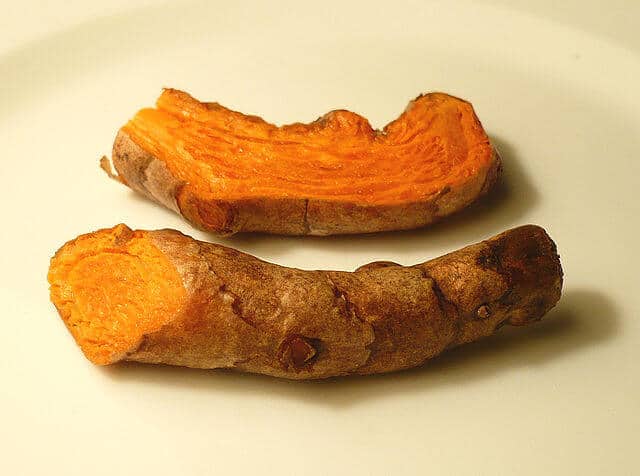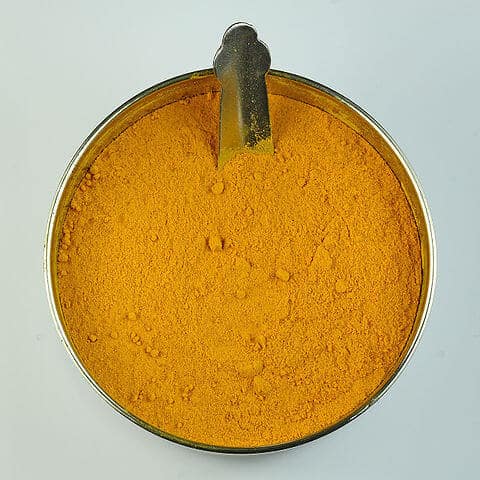Turmeric Tea: Try These 5 Recipes To Reduce Pain & Inflammation
Before
we get to the turmeric tea recipes, let’s find out a bit more about
turmeric itself. (If you want to skip this part, the turmeric tea
recipes are further down the page.)
What is Turmeric?
Recent research has seen it promoted in the eyes of western science and it has been deemed as highly effective for treating osteoarthritis and various other health issues such as Crohn’s disease, stomach ulcers, skin wounds, kidney inflammation, and many, many more. It is also full of plenty of healthy nutrients such as protein, dietary fiber, niacin, Vitamin C, Vitamin E, Vitamin K, potassium, calcium, copper, iron, magnesium, and zinc.
A member of the ginger family, turmeric is a root that usually comes in a powdered form, although it is also available in capsules, tincture, fluid extracts, and tea.

Turmeric Root
What is Turmeric Tea?
Turmeric tea is a light and refreshing tea made with water, warming aromatic spices, honey, and, of course, turmeric. The tea has a slightly sweet, earthy flavor with just a hint of spice, making it especially perfect for warming up on a colder day. Tasting very similar to chai tea, turmeric tea is a delicious way to heal, cleanse, and detoxify your body.Turmeric Tea Benefits
Turmeric tea is renowned for the multiple health benefits it offers, particularly when it comes to inflammation and pain – helping to treat health issues such as osteoarthritis, rheumatoid arthritis, and ulcerative colitis. It can also help patients with cancer, multiple sclerosis, Alzheimer’s, and high cholesterol, to name but a few.Turmeric can also help to prevent the blood from clotting and reduces the often-painful inflammation caused by wounds, acne, and various other skin conditions.
Anti-inflammatory
When it comes to pain relief, so many people across the globe call upon anti-inflammatory drugs such as ibuprofen and aspirin, to relieve the symptoms of everything from headaches, backaches, and other muscular aches and pains. Whilst these medicines are really effective at relieving the pain and inflammation caused by a whole range of conditions, they can cause many adverse side effects, especially with long-term use.
In fact, the side effects of the long-term use of anti-inflammatory drugs include, but are by no means limited to, nausea, diarrhea, gastrointestinal bleeding, hypertension (high blood pressure), increased risk of heart attack, increased risk of kidney cancer, and erectile dysfunction.
But the truth is, natural home remedies such as turmeric can often deliver the same effects as these medications, without many of the potential side effects.

Turmeric powder Used for the Tea
Well, in exactly the same way as anti-inflammatory drugs such as ibuprofen. These drugs work by inhibiting an enzyme, COX-2 (Cyclooxygenase 2), which causes inflamed areas of the body to become painful and more inflamed. By blocking this enzyme, the medication blocks the pain and reduces the inflammation.
Turmeric works so well because it contains high levels of a compound called curcumin, which is a COX-2 inhibitor too. However, whilst turmeric has the same positive effects as the anti-inflammatory drugs, it rarely causes side effects. After all, it has been eaten and drunk across most of South East Asia for thousands of years without causing any problems.
Liver cleansing
As well as being a great anti-inflammatory, turmeric is also a powerful liver cleansing spice. In today’s toxin and chemical filled world, it’s easy for your liver to become stressed and overworked. Think about it, there are toxins all around us, in our air, our food, and our water. If your liver can’t keep up with the level of toxins feeding into it, they start to accumulate in the body and can have a serious effect on your health.
As well as avoiding processed foods and using lots of natural personal care and cleaning products, you can also help your liver out by incorporating herbs and spices into your diet to support your body’s detox pathways. As well as being a great anti-inflammatory, turmeric is also a powerful liver cleansing spice. So, if you’re looking to give your liver a boost, then turmeric tea could offer the perfect solution.
Prevents Cancer
It is believed that turmeric can help to prevent prostate cancer, slow or even stop the growth of existing prostate cancer, and even destroy cancer cells. Research has also shown that the active components in turmeric make it one of the best protectors against radiation-induced tumors, and it is also has preventive effect against
Relieves Arthritis
Turmeric has also been linked to arthritis, providing an effective form of pain relief to those who suffer from osteoarthritis and rheumatoid arthritis, as well as many other forms of the disease. This is because the anti-inflammatory properties that can be found in turmeric work to destroy the free radicals in the body that are renowned for damaging body cells. In fact, case studies have proven that those suffering from arthritis who consume turmeric on a daily or regular basis, experienced far more relief from symptoms such as joint pain and inflammation, compared to those who didn’t consume turmeric.
Controls Diabetes
Turmeric is also regularly used to treat diabetes. It works by helping to moderate and control insulin levels in the body. But not only does it assist in the moderation of insulin levels, it is also renowned for improving glucose control, whilst increasing the effect of the medications that are used to treat diabetes.
Another significant benefit of using turmeric to treat diabetes is that it is able to reduce insulin resistance in the body, and it’s also been suggested that it could even prevent the onset of Type-2 diabetes! It’s important to note though that, if combined with other strong medications, turmeric can cause low blood sugar, so it’s always best to check with your doctor before using it alongside any other medications.
Reduces Cholesterol Levels
It’s highly likely that, at some point in your lifetime, you will suffer from high cholesterol, especially as you grow older. However, research has proven that, by regularly using turmeric as a food seasoning, it can significantly decrease cholesterol levels. Maintaining a healthy cholesterol level is paramount, as it is a well known fact that high cholesterol notoriously leads to a whole host of serious health problems such heart disease and stroke.
Immunity Booster
Also known as lipopolysaccharide, turmeric can help to stimulate and strengthen your body’s immune system. This is because it is full of antibacterial, antiviral and antifungal agents that work together to fight against colds, flu and coughs, ensuring that your immune system is strong.
However, if you do find yourself suffering from cold or flu like symptoms, simply mix one teaspoon of turmeric powder into a glass of warm milk, and drink daily until you feel better.
It’s inevitable that, from time to time, we all find ourselves nursing a cut or graze caused by a silly accident. However, even the smallest cuts or grazes can cause infection or take a long time to heal.
Both a natural antiseptic and anti-bacterial agent, turmeric can also be used as a highly effective disinfectant, protecting your skin or graze against infection whilst speeding up the healing process. All you need to do is sprinkle a small amount of turmeric powder onto the affected areas and you will instantly be protected. But that’s not all, turmeric can also be used to help to repair damaged skin, treat burns and even be used to effectively treat psoriasis along with a whole host of other common inflammatory skin conditions.
Other benefits include:
- Detoxifies body and liver
- Boosts immunity by improving liver function
- Protects liver tissue
- Cleanses and purifies the blood
- Eases symptoms of coughs and colds
- Improves circulation in the body
- Improves skin complexion
- Prevents internal blood clotting
- Reduces inflammation – all types of arthritis and other inflammation
- Stimulates secretion of bile which helps break down fat
Turmeric Tea Recipes
Making turmeric tea is nice and simple, and there are all sorts of variations and adaptations of the recipe, allowing you to customize it to suit your personal tastes. Whichever recipe you use (or even if you get creative and make up your own version of turmeric tea!), it’s important that you only use good quality turmeric powder, or alternatively, you can use grated fresh turmeric root for a stronger flavor.
Turmeric should be easy to find in your local grocery store or supermarket. Additionally Amazon probably has the most extensive range or turmeric powder and supplements available.
Recipe 1: Basic Turmeric Tea
Ingredients
- 4 cups of water
- 1 teaspoon turmeric
- Lemon or honey (or both!) to serve
- Heat 4 cups of water, bringing it to the boil.
- Add 1 teaspoon of turmeric.
- Reduce the heat and let the mixture simmer for around 10 minutes.
- Remove from the heat and strain using a fine sieve.
- Pour into serving cups and add lemon or honey to taste.
Ingredients
- 2 cups water
- 1 inch fresh ginger root, minced
- 2-teaspoon ground turmeric
- 1-teaspoon ground cinnamon
- 1 lemongrass tea bag
- 6 peppercorns (you can leave these out if you prefer!)
- Pinch of sea salt
- Bring the water to the boil in a small saucepan.
- Add the peeled, minced ginger root, turmeric, cinnamon, peppercorns (remember, these are optional!), sliced oranges, and sea-salt.
- Allow the mixture to simmer on a medium low heat for 10-15 minutes.
- Add the lemongrass teabag and allow to steep for around 3 minutes.
- Remove the teabag and pour the mixture into a mug.
Why not give your turmeric tea a creamy twist?
Ingredients
- 1 cup coconut or almond milk
- ½ teaspoon turmeric
- A pinch cayenne pepper
- ½ inch finely chopped ginger root
- 1 ½ teaspoon of honey (or an alternative sweetener)
- In a pan, gently warm the cup of coconut or almond milk.
- Mix together the turmeric, cayenne pepper, finely chopped ginger root, and the honey.
- Add a small amount of the warmed milk and stir it into the mixture.
- Mix well until all of the lumps have disappeared.
- Add the rest of the milk and mix.
- Strain and then serve.
Ingredients
- 1/3 cup honey
- 2 ½ teaspoons ground turmeric
- Lemon
- Freshly ground black pepper
- Mash the turmeric and honey into a paste (you can then store this in a jar to ensure you have it on hand whenever the need arises).
- For each cup of sweet turmeric black pepper tea, take a heaped teaspoon of the turmeric and honey paste.
- Top with boiling water.
- Add a squeeze of lemon and a few generous twists of freshly ground black pepper.
- Stir and enjoy!
Turmeric lemon tea combines the sweet, tangy flavours of lemon and ginger, with a gentle kick from the cayenne pepper.
Ingredients
- 1 cup boiling water
- 1 tablespoon lemon juice
- 1/8 tablespoon ground ginger
- 1/8 tablespoon turmeric
- Cayenne
- Honey to taste
- In a mug, mix together the lemon juice, turmeric, ginger and cayenne.
- Top with boiling water.
- Stir well.
- Add honey to sweeten to your personal taste.
There are numerous ways to serve your turmeric tea, here are a few of our favorites…
- Add a slice of orange, a dash of honey, the juice of 1 lemon, and 1 teaspoon of coconut oil.
- Turmeric also works perfectly with a slice of apple or cucumber.
- If you want a milder taste why not add extra water.
- Serve chilled in the summer for a refreshing and healthy drink.
No comments:
Post a Comment